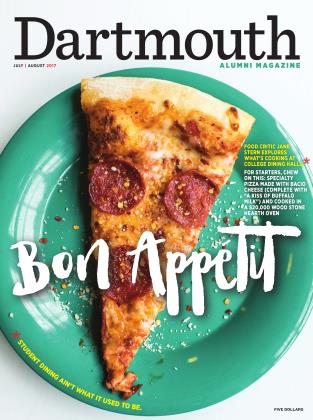The Hop's New Groove
CAMPUS
notes from around the green
THE ARTS
In 2011, cellist Yo-Yo Ma and his Silk Road Ensemble performed on a rainy day at New Haven, Connecticut’s International Festival of Arts and Ideas in front of an ecstatic crowd of 8,000 people ankle-deep in mud. The festival’s director, Mary Lou Aleskie (inset), had convinced the event’s board to raise $300,000 above its original budget to make the event free of charge—and personally escorted Ma through the muck to perform.
Now director of the Hopkins Center, Aleskie hopes to stage events of similar energy and dynamism in Hanover. Festivals, she says, “bring people together and create memories to walk away with.”
Under her leadership the Hop is poised to re-energize area residents around its offerings and to focus especially on student outreach. “I’m really excited about the housing communities as a way to engage and excite people in their own homes and spheres of existence,” Aleskie says. “Instilling the understanding and the values the arts create within our leaders of tomorrow will help shape a better world.”
Aleskie hopes to build on recent programming such as the Nile Project, a music ensemble of artists from countries along the Nile who connected last spring with students studying African politics, entrepreneurship and water issues. “This is a great time for the Hop to be much more outward-looking,” says Aleskie, by bringing in artists and performers from around the globe, creating art that matters to the world and bridging distances. Aleskie’s prior experience establishing the Yale-China Arts Fellowship informs her opinion that “when people collaborate to make something, there is no more profound way to bring people together,” Aleskie says. “It’s pretty clear that the world is increasingly one of contrast between those who believe that borders have value and those who understand that societies intermingle. We can’t fulfill our entire mission at the Hopkins Center without addressing those social issues.”
Among the projects Aleskie is excited about nurturing are the longtime New York Theatre Workshop residency, which incubates works in progress and allows students to learn from professional playwrights and directors, and the interdisciplinary STEM Arts program that brings composers to campus to collaborate with science, technology, engineering and math faculty. “As multifaceted as the Hopkins Center is, we need to be doing more to push outwards and reach beyond our own borders and disciplines,” she says.
Jessica Fedin’17
SITING VOICES
We scapegoat the most vulnerable instead of confronting the most powerful.”
-HARVARD PROFESSOR CORNEL WEST
CHOSEN
2,092
Students offered admission to the class of 2021
CAR SICK
79%
Increase in cost of a single-term campus parking permit since 2015, from $42 then to $75 today
PROFESSORS’ COMPENSATION
Dartmouth ranks sixth among Ivy schools when it comes to paying professors, and 19th overall among all peer group colleges and universities. “Between 2009 and 2012, compensation levels at our peer institutions moved ahead of Dartmouth,” says President Phil Hanlon 77. “We are committed to addressing this discrepancy and providing competitive compensation to our faculty...who provide the fundamental hallmark of the Dartmouth experience.”
Harvard $230,292 Columbia $209,475 UPenn $201,978 Princeton $200,403 Yale $198,369 Dartmouth $175,239 Brown $170,649 Cornell $167,238 Source: Chronicle of Higher Education; data is for full professors for 2015-16
VOICE OF INSPIRATION “One of the greatest teachers I ever had” and “I’ll never forget that laugh” were common reactions among alumni when legendary English professor Bill Cook died in May. A noted poet and orator, Cook joined the College in 1973 and went on to help establish the African and African American studies program. He was 83.
 View Full Issue
View Full Issue
More From This Issue
-
 FEATURE
FEATURE“The Idiocy of War”
JULY | AUGUST 2017 By C.J. Hughes ’92 -
 COVER STORY
COVER STORYBon Appetit
JULY | AUGUST 2017 By Jane Stern -
 FEATURE
FEATUREUpside-Down World
JULY | AUGUST 2017 By Jennifer Wulff ’96 -
 FEATURE
FEATUREThey Are What They Eat
JULY | AUGUST 2017 By JESSICA FEDIN ’17 -
 FEATURE
FEATURESix Great Food Finds
JULY | AUGUST 2017 By JANE STERN -
 INFOGRAPHIC
INFOGRAPHICLone Pine Wine
JULY | AUGUST 2017 By JESSICA FEDIN ’17
Notebook
-
 notebook
notebookNEWS AND NOTES
JANUARY | FEBRUARY 2017 -
 notebook
notebookWhy Dartmouth?
JANUARY | FEBRUARY 2018 -
 notebook
notebookWater Proof
NOVEMBER | DECEMBER 2020 -
 notebook
notebookHelping Those Who Help
JULY | AUGUST 2023 By CHRIS QUIRK -
 notebook
notebookWinds of Change
SEPTEMBER | OCTOBER 2020 By Elizabeth Janowski ’21 -
 notebook
notebookThayer Hires New Dean
JULY | AUGUST 2019 By George M. Spencer

